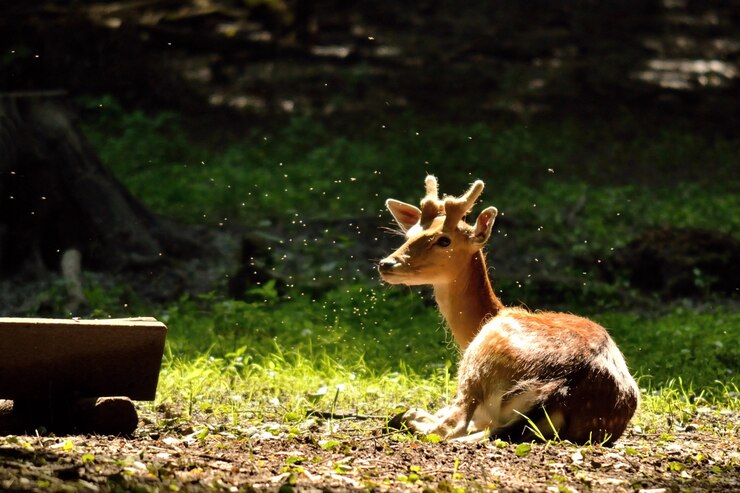Most Popular Animals of the forest
Introduction:
Forests are more than just trees they’re full of life. From the ground to the treetops, animals find food, shelter, and a safe place to live. Tiny insects crawl in the soil, birds nest in bushes, and squirrels leap from branch to branch.
Some animals live under the ground. Others walk through bushes or fly high in the trees. Each one helps the forest stay strong and full of life.
Let’s take a closer look at where these animals live—and how the forest gives them everything they need.
Animals of the forest
Find out which animals live in the forest and what tasks the forest has!
The forest provides a habitat for many animals. They find food and shelter there at the same time. Each animal takes its own place – far up in the treetop, in bushes and shrubs or at the very bottom of the ground.

Profile Forest Habitat
Number of species in the forest:
approx. 6,700 animal species, approx. 4,700 plant species
The forest offers the animals:
- Nesting and breeding sites
- Protection from weather and predators
- Food
- Scouting sites for predators
The forest offers nature
- Water reservoir
- Soil and avalanche protection
- Climate protection, “air filter”
- Oxygen production
The floors of the forest
The forest is like a high-rise building with four floors or so-called “layers”: soil, herbaceous, shrub and tree layers. The more sunlight penetrates through the canopy of the tree layer, the more pronounced the herbaceous, shrub and soil layer. Different animals live in each layer. The next time you walk through the forest, watch what animals you see.
1. Soil layer of the forest (directly on the ground)
Imagine walking through a peaceful forest. As you step softly on the ground, you might not realize there’s a whole world just beneath your feet. The forest floor is covered with soft moss, colorful mushrooms, crunchy leaves, and tiny lichens. It looks quiet but it’s full of life!
If you look closely, you’ll see busy insects crawling around, spiders spinning their webs, and even small reptiles hiding under the leaves. And that’s not all this layer is also home to little mammals like mice and hedgehogs. They scurry through the undergrowth or dig cozy burrows to sleep in.
The soil here is rich and full of nutrients. It gives plants the strength to grow, but it also feeds many animals. Some come to eat, others come to hide, and a few even make this layer their forever home. It’s like a secret neighborhood underground, full of tiny stories happening every day.
Animals in the soil layer:
- Lizard
- Fire salamander
- Hedgehog
- Insects
- Beetle
- Mouse
- Snail
- Spider
2. Herb layer of the forest (up to 1.5 m)
Between the grasses and ferns of the herb layer, insects in particular have their habitat. The plants serve them as protection and as a source of food at the same time. The more sunlight penetrates through the canopy of the trees, the more plants grow and thrive in the herb layer.
Animals in the herb layer:
- Bee
- Badger
- Brown hare
- Fox
- Firefly
- Beetle
- Lynx
- Butterfly
- Wasp

3. Shrub layer of the forest (up to 5 m)
Here, animals such as deer find shelter from bad weather and predators. Birds use the shrubs to hide in them, build nests and peck at delicious fruits (e.g. rowan berries, sloes, raspberries).
A Safe Spot in the Thorns
One sunny afternoon, I watched a tiny bird flutter into a thorny bush outside my window. At first, I wondered why it chose such a sharp, uncomfortable place. But then I saw it hidden deep inside the thorns was a small nest with baby birds.
The thorns weren’t just there to poke they were protectors. No cat or snake would dare reach inside. The mama bird had picked the perfect spot. It reminded me how even the harshest things in nature often have a gentle purpose
Animals in the shrub layer:
- Blackbird
- Thrush
- Squirrel
- Hazel dormouse
- Dormouse
- Roe deer
- Robin

4. Tree layer of the forest
The tree layer is mainly home to birds, which have their nesting and breeding sites there. They are well protected from predators that live on the ground in this layer. But mammals such as the squirrel or the pine marten also climb up to such heights. The squirrel even builds its nest up there, it is called “Kobel”.
Animals in the tree layer:
- Great Spotted Woodpeckers
- Owls
- Squirrel
- Jay
- Bats
- Marten

Interesting facts about tree species in the forest
- Deciduocs forest: elms, willows, alders, birches
- Coniferous forest: pines, spruces
- Mixed forest: Mix of deciduous and coniferous forest
However, forests are also given their own names depending on the location, climate or condition. The mountain forest is logically located in the mountains. A swamp forest is a wet, moist forest in swampy areas. The rainforest in South America has a particularly humid climate. A primeval forest or “primary forest” is a completely natural forest. A riparian forest grows on the edge of streams and rivers.
Did you know?
- 32% of the land area in Germany consists of forest.
- Our native trees usually grow up to 40 m high.
- Oaks can live up to 850 years.
80% of sunlight is intercepted by tree leaves.
Conclusion
The forest is a big shelter with many layers. From tiny hedgehogs to flying birds, each animal has its own space to live and grow. They all play a role in keeping the forest healthy, and in return, the forest keeps them safe.
Next time you’re in the woods, take a closer look. There’s life everywhere even in the quietest spots.
Animals of the Forest: How Much Do You Know?
Explore the layers of the forest and the animals that live in them. Take this 5-question quiz to test your knowledge!
Q1: Which forest layer is home to animals like hedgehogs, spiders, and mice?
Q2: Which animal might you see in the herb layer among grasses and ferns?
Q3: Which forest layer is described as being like the top floor of a high-rise building?
Q4: What benefit does the forest give to animals?
Q5: Which animal might build its nest in the shrub layer, protected by thorns?










One Comment